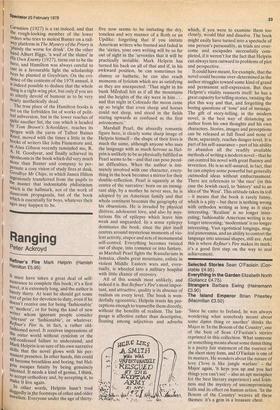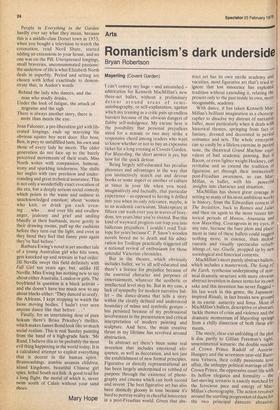Selected Stories Sean O'Faolain (Constable £4.95)
Everything In the Garden Elizabeth North (Gollancz £4.75) Strangers Barbara Ewing (Heinemann £3.90)
The Island Emperor Brian Priestley (Macmillan £3.50)
'Since he came to Ireland, he was always wondering what somebody meant about some damn thing or another' thinks the Major in 'In the Bosom of the Country', one of the best of Sean O'Faolain's stories. reprinted in this collection. What someone or something means about some damn thing is a pretty fair statement of the essence of the short story form, and O'Faolain is one of its masters. He wonders about the nature of love Clove is like jungle warfare' — the Major again, 'it keys you up and you feel things you can't see' — also an apt metaphor for the best literary experience) and Irishness and the mystery of uncompromising faith and its effect on human action. 'In the Bosom of the Country' weaves all these themes: it's a gem in a treasure chest.
People in Everything in the Garden hardly ever say what they mean, because this is a middle-class Dorset town in 1953, when you bought a television to watch the coronation, read Nevil Shute, started adding an extensions to your house, and no one was on the Pill. Unexpressed longings, small braveries, unconsummated passions: the undertow of life is what Elizabeth North deals in superbly. Period and setting are chosen with lethal exactitude to demonstrate that, in Auden's words
Behind the lady who dances, and the man who madly drinks, Under the look of fatigue, the attack of migraine and the sigh There is always another story, there is more than meets the eye.
Joan Falconer, a pre-liberation girl with liberated longings, ends up marrying the obvious square boy next door. Her boss, Ben, is prey to unfulfilled lusts, his own and those of every lady he meets. The older generation do not face up to the barely perceived movements of their souls. Miss North writes with compassion, humour, irony and sparkling tenderness. She shifts her angles with rare precision and understanding and great technical assurance. This is not only a wonderfully exact evocation of the era, but a deeply serious social comedy which points to the waste and sadness in unacknowledged emotion; about 'women who knit, or drink gin each evening ... who .. . nod over life and swallow anger, jealousy and grief and smiling blandly at their husbands, move gently in their drawing rooms, puff up the cushions before they turn out the light, and even as they bend they feel that funny pain again they've had before.'
Barbara Ewing's novel is yet another tale of a young Australian girl who hits town, gets knocked up and retreats in bad order. Jill Neville swept this field definitely with Fall Girl ten years ago, but, unlike Jill Neville, Miss Ewing has nothing new to say about either Australia, London or girls. The boyfriend in question is a black activist and she doesn't have too much new to say about blacks either: 'They danced so sexily, the Africans, I kept stopping to watch the loose moving bodies. I hadn't ever seen anyone dance like that before .
Finally, for an intertaining dose of pure hokum there's Brian Priestley's thriller, which makes James Bond look like so much social realism. This is real Sunday painting from the hand of a high-grade hack: 'Mr Rand, I believe this to be probably the most evil thing happening in the world today, It is a calculated attempt to exploit everything that is decent in the human spirit.' Brainwashings, zombie assassin children, island kingdoms, beautiful Chinese girl spies, lethal South sea fish. A good read for a long flight, the moral of which is, never swim south of Calais without your sand shoes.
Mary Hope



































 Previous page
Previous page